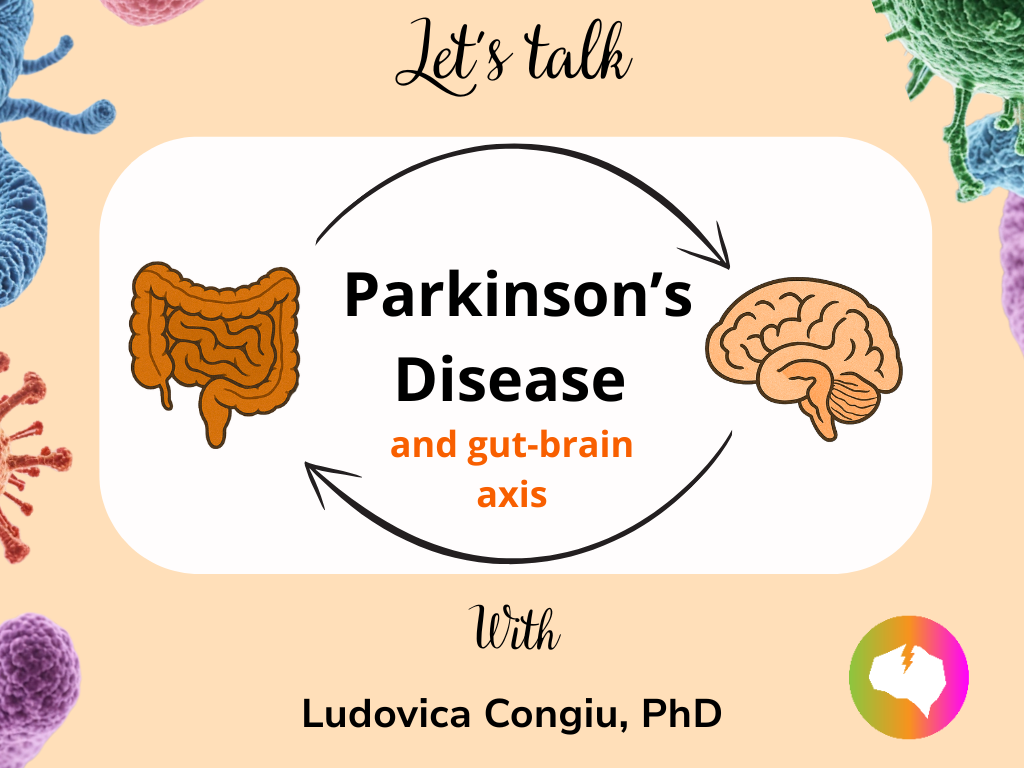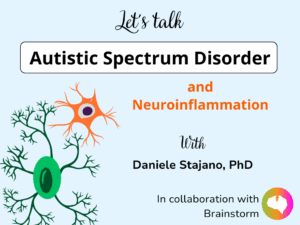
Gut Feelings: How The Intestinal Microbiota Shapes Parkinson’s Disease
Ludovica Congiu, PhD
“The gut is the engine of the body, and the mind follows.” — Dr. Michael Ruscio
For decades, scientists have viewed the brain as the main battlefield in neurodegenerative diseases such as Parkinson’s disease (PD). In the last decade, a growing body of research is revealing something surprising: the gut — often called our “second brain” — might play a much bigger role than expected.
The community of trillions of bacteria, fungi, and other microorganisms living in our intestines — known as the gut microbiota — seems to influence not only digestion and immunity but also brain health. In fact, scientists are now exploring how changes in this delicate ecosystem could contribute to the development and progression of Parkinson’s disease.
Parkinson’s Disease in a Nutshell
Parkinson’s disease is the second most common neurodegenerative disorder worldwide. It is characterized by a range of motor symptoms, including tremor, muscle stiffness, slow movements, and problems with motor coordination and balance.
These symptoms stem from the loss of dopamine-producing neurons in a brain region called the substantia nigra. When these neurons die, dopamine levels drop, disrupting communication between brain areas that control movement.
However, Parkinson’s is not just a movement disorder. Many patients experience non-motor symptoms — such as depression, sleep problems or loss of smell — that often appear years before motor symptoms do. Among these early signs, gastrointestinal (GI) issues, such as constipation, bloating, and difficulty swallowing, have gained special attention.
The Gut-Brain Connection
The gut has long been known to communicate with the brain through a network of nerves, hormones, and immune signals — collectively known as the gut-brain axis.
Dr. Michael D. Gershon, who famously described the gut as our “second brain,” showed that the intestines contain a vast network of neurons — the enteric nervous system (ENS) — that works closely connected to the brain.
The gut microbiota helps to regulate this system and plays crucial roles in supporting metabolism and nutrient absorption, producing vitamins, training the immune system and protecting it against pathogens.
When this ecosystem is disturbed — a state known as dysbiosis — it can trigger inflammation, oxidative stress, and even affect the blood-brain barrier, the brain’s protective shield. These same features are observed in Parkinson’s disease, suggesting that gut imbalance might contribute to its onset or worsen its symptoms.
From the Gut to the Brain: Braak’s Hypothesis
In 2007, German neuroscientist Heiko Braak proposed a groundbreaking idea: Parkinson’s disease might actually start in the gut.
According to Braak’s “dual-hit hypothesis,” Parkinson’s may start when a virus or bacteria enter the body through the gut or olfactory system (nose) and trigger the abnormal folding (misfolding) of a protein called alpha-synuclein. These abnormal proteins then travel along the vagus nerve — which connects the gut to the brain — eventually reaching brain areas involved in motor control.
Braak also described six stages of the disease. In the first two, the enteric nervous system is affected, causing gastrointestinal symptoms like constipation or abdominal pain, which appear long before any movement issues. This could suggest that Parkinson’s starts in the gut and moves upward — a radical shift in how we understand the disease.
Environment, Diet and Microbiota
Environmental factors clearly play a major role in Parkinson’s risk. It is known that Exposure to pesticides, heavy metals, and industrial chemicals increases the likelihood of developing the disease. Nonetheless, what we eat may also be just as important.
Certain nutrients and dietary patterns can promote a healthy microbiome (which refers to the microorganisms and their collective genetic material within the intestines), while others can disrupt it. For instance:
– Diets rich in fiber, fruits, and vegetables, olive oil, and fish (like the Mediterranean diet) support beneficial gut bacteria and are associated with reduced inflammation and improved cognitive function.
– Diets high in saturated fats and processed foods encourage harmful bacterial growth and inflammation.
A growing number of studies show that people with Parkinson’s often have less microbial diversity in their gut and higher levels of pathogenic bacteria. A 2021 meta-analysis by Romano and colleagues found distinct microbiome profiles in Parkinson’s patients compared to healthy individuals — including an overgrowth of certain bacteria and higher levels of metabolic markers of dysbiosis.
What This Means for Treatment
If the gut plays such a strong role in Parkinson’s, it could open the door to new treatment strategies.
Probiotic therapy — using beneficial bacteria to restore balance — is already being explored. Some researchers are also investigating fecal microbiota transplants (FMT) as a way to rebuild a healthy gut ecosystem. In particular, species such as Lactobacillus and Prevotellaceae appear to be reduced in PD and might have protective effects.
Meanwhile, dietary approaches are gaining attention as a natural, low-risk way to support brain and gut health. Although following the Mediterranean diet may not cure Parkinson’s, it could help slow its progression and improve overall well-being.
The Bigger Picture: Prevention and Early Detection
The presence of gastrointestinal symptoms years before motor problems suggests that Parkinson’s might be detectable earlier than we think. If doctors can identify changes in the gut, microbiota that signal early PD, they might intervene before significant brain damage occurs.
However, not all cases of Parkinson’s follow the same pattern, and the gut may not be involved in every form of the disease. Still, understanding these differences could help tailor personalized treatments based on each patient’s biological profile.
A Future Where Diet Meets Neuroscience
The link between the gut and brain is one of the most exciting frontiers in modern medicine. While researchers are still unraveling how exactly gut bacteria influence Parkinson’s, one message is becoming clear: taking care of your gut means taking care of your brain.
Future therapies may combine traditional medications with targeted nutrition and microbiome modulation — offering patients a more holistic, integrated approach to deal with Parkinson’s.
In the meantime, maintaining a healthy, balanced diet is not just about keeping your weight in check — it is an investment in your long-term brain health and a potentially in the fight against Parkinson’s disease.
📖 References:
- (1) Galvan A, Wichmann T (2008) Pathophysiology of parkinsonism. Clin Neurophysiol 119, 1459-1474.
- (2) Moustafa AA, Chakravarthy S, Phillips JR, Gupta A, Keri S, Polner B, Frank MJ, Jahanshahi M(2016) Motor symptoms in Parkinson’s disease: A unified framework. Neurosci Biobehav Rev68, 727-740.
- (3) DeMaagd G, Philip A (2015) Parkinson’s disease and its management: Part 1: Disease entity, risk factors, pathophysiology, clinical presentation, and diagnosis. P T 40, 504-532.
- (4) Ilie OD, Ciobica A, McKenna J, Doroftei B, Mavroudis I (2020) Minireview on the relations between gut microflora and Parkinson’s disease: Further biochemical (oxidative stress), inflammatory, and neurological particularities. Oxid Med Cell Longev 2020, 4518023.
- (5) Yemula N, Dietrich C, Dostal V, Hornberger M. Parkinson’s Disease and the Gut: Symptoms, Nutrition, and Microbiota. J Parkinsons Dis. 2021;11(4):1491-1505. doi: 10.3233/JPD-212707. PMID: 34250955; PMCID: PMC8609682.
- (6) Hawkes CH, Del Tredici K, Braak H (2007) Parkinson’s disease: A dual-hit hypothesis. Neuropathol Appl Neuro-biol 33, 599-614.
- (7) Chen H, Zhang SM, Hernan MA, Willett WC, Ascherio A (2002) Diet and Parkinson’s disease: A potential role of dairy products in men. Ann Neurol 52, 793-801.
- (8) Keightley PC, Koloski NA, Talley NJ (2015) Pathways in gut-brain communication: Evidence for distinct gut-to- brain and brain-to-gut syndromes. Aust N Z J Psychiatry,49, 207-214.
- (9) Romano S, Savva GM, Bedarf JR, Charles IG, Hilde- brand F, Narbad A (2021) Meta-analysis of the Parkinson’s disease gut microbiome suggests alterations linked to intestinal inflammation. NPJ Parkinsons Dis 7, 27



